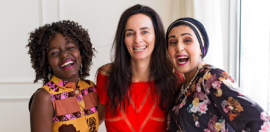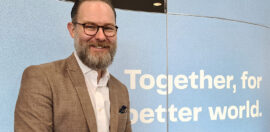The Passion and Science of Giving
21 August 2014 at 9:29 am
Philanthropist and chair of ANZ and Coca Cola Amatil – David Gonski says a deep family involvement in medical science led him into the world of giving, but his business experience taught him a lot about impact philanthropy in this interview first published in the ANZ publication Bluenotes.
Andrew Cornell, BlueNotes: How do you understand philanthropy?
David Gonski: Philanthropy is a very personal thing and it should remain so. I believe it is a very serious mistake if you judge people on what they do in this area and how they do it. The only person you should judge is yourself. Everyone is entitled to choose their own way.
BN: How did you choose where to give in the beginning?
DG: My life has been deeply involved with medical science. It is in my family – I am the son of a brain surgeon, the husband of a paediatric dermatologist, the father of a medical practitioner. I am surrounded by people whose lives, in a very real sense, are making a difference. That’s not to malign what I do or the financial world generally but I see these people making an immediate difference. So for me, I see I can contribute to that world by giving, time and money, seeking to make my efforts have a social outcome.
BN: And how do you decide what and how you give?
DG: I think when I started my view was to give, as they saying goes, “a little bit to a lot”. But I think I realised that wasn’t having the social impact I wanted. It wasn’t very disciplined. In my business life I see talent and effort directed to particular outcomes but I wasn’t seeing that in what I was giving. So I decided to bring some of that discipline across and to give more to less. My family and I have become involved in fewer charities and so it was incumbent upon us to choose carefully.
BN: You chose quite an idiosyncratic project?
DG: Because of my wife’s line of work, we believed there was a big problem with scabies in north western NSW. So we flew there to find out more and what we found was that the problem was not so great there – but there was a huge problem with teeth and gum disease. What there was a need for was a remote dentistry service, a sort of flying doctor service for teeth.
So we decided on a project for a dentist, a dental nurse and dental educator of the air. And, if you’ll excuse the pun, that was a project which literally took off.
BN: One of the interesting perspectives you brought to this project was the business one.
DG: We tested the original concept we had (assisting with scabies) and it turned out to be not needed, so we ended up establishing something different, the tooth project. We were assisted by the Royal Flying Doctor Service who were excellent. We really wanted to know what we were doing was working so we set up KPIs (key performance indicators). We did bring business thinking to the table and I think that is something we are seeing more in the world of philanthropy, Bill Gates has set the pace on this. For us it has been amazingly successful.
BN: And yet an interesting element with the tooth project is you see it as finite?
DG: We are at the point now where the project, in north western NSW, can form a model and I think it is time for perhaps government involvement. It has and can really move beyond our involvement. If you think about it terms of us working with a Not for Profit on an idea, providing some seed capital, establishing the enterprise and now our role hopefully being taken over by government.
BN: So it’s like a venture capital fund? Venture philanthropy? You prove up the model and now encourage government and others to be involved?
DG: It is exactly like venture capital. To get a result you want precisely those disciplines.
BN: You recently launched the Salvation Army’s annual Red Shield Appeal with Cate Blanchett, what was your thinking there?
DG: I have always considered the Salvation Army an excellent organisation and I still do, despite the problems and issues which have become public this year. So when they asked me I was keen to help and I was able to assist them through my relationship with Cate to bring a real star along – that really was the multiplier effect. The Salvation Army are able to raise funds effectively and do enormous good. People are inspired by that work and having Cate involved amplified this.
BN: Can you give advice on giving?
DG: I would say, like most things. Follow your passion. Have a think about what makes you feel good. Is it helping the indigenous? Sports? Education? Health? What are your interests? That is the first question and it guides what you do. And you can start small. When you talk to big charitable organisations about their benefactors, big donations start with small donations.
BN: You are very public about your philanthropy, should everyone be?
DG: Because I was involved in quite a lot of charities I know how they work, I have quite a good idea of how money is raised and how it is spent. I know that a donor can help in two ways – by giving money or assets and also by putting their name to their donation. The latter provides an imprimatur which can cultivate further gifts from others.
David Gonski AC is an Australian public figure and businessman. He is a philanthropist and Patron of the Australian Indigenous Education Foundation. Gonski's previous positions held include Chair of the Australia Council for the Arts, President of the Board of Trustees of the Art Gallery of New South Wales, Chair of the National Institute of Dramatic Art; Chair of the Board of Trustees of Sydney Grammar School and Chair of Film Australia. During 2011, Gonski was Chair of the Expert Advisory Panel of the Commonwealth Government's Review of the Funding of Schools in Australia, commonly referred to as 'the Gonski review'.







